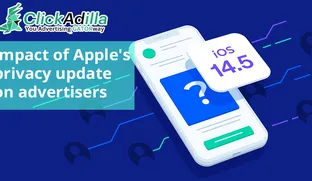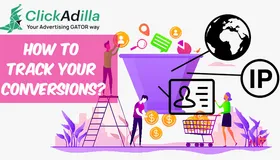
Apple's new update already affected millions of advertisers worldwide. Let's figure out how to track ads in the new realities.
▶ Who will be primarily affected by Apple’s new features
▶ What are advertisers to do?
▶ What experts say: forecasts
▶ Facebook Conversion API solution
▶ Key takeaways
Tracking conversions is used by advertisers to gain better insight into the customer’s funnel journey, and customize their ad experience. This is an essential part of setting up an ad campaign. Since collecting traffic insights you will be able to understand which sources and campaigns drive more conversions. By properly optimizing your campaign, you will minimize costs and achieve better results.
There are different tracking solutions. ClickAdilla have integrations with the most popular tracking platforms.
In this article, I would like to highlight the iOS 14.5 update, which was released on 26.06.2021. This update is based on Apple's new privacy policy. Let's figure out who will be most affected by this update and what they can do.
Who will be primarily affected by Apple’s new features
Most of the changes will affect Facebook, 99% of whose revenue comes from advertising (around $ 21.5 billion in 2020). The thing is that nobody collects as much user data as Facebook, and these new features can end up depriving the social network of more than half its income (after all, hardly every user will be ok with their actions being tracked and their user data collected and analyzed for ad personalization purposes.
Now, according to Apple’s new policy, all online platforms must use a new framework that restricts and delays reporting on events and conversions. This was done deliberately so that the advertiser can’t correlate a user with a purchase (even indirectly). In other words, they will be able to find out only as much as the client lets them. Facebook was quick to reply and all their ad accounts changed:
🔵 the attribution window — 1 day after your ad was viewed, 7 days after clicking it;
🔵 the way the attribution window is set up— now it’s installed not at the account level, but at the ad group level.
In simple terms, Facebook will now have much less information to optimize ad campaigns in the long run (where the user decision cycle can be quite long).
However, nothing will change for campaigns that focus on cold potential clients. After all, Facebook knows its users well and launching ads aimed at a wide audience will stay exactly the same. This also applies to identifying the target audience’s interests. But Facebook’s retargeting itself will become more expensive and complex (the same as analyzing the effectiveness of a particular company and optimizing it).
What are advertisers to do?
To prepare for the coming changes, you need to take 2 important steps:
1. Verify your domain.
2. Prioritize 8 pixel events per domain (Facebook will transmit data only for the event with the highest priority).
Both actions can be performed through the Business Manager account.
What experts say: forecasts
The iOS 14.5 shell is highly likely to include a switch that will allow the user to change their privacy settings in one click. Even if they first refuse to be tracked and then suddenly change their mind. According to data from Apple, today the company is considering the following course of events:
1. Let's say the user has agreed to their personal data being processed and tracked.
2. But at the same time, they turned off the tracking function for a specific application (for example, good ol’ Facebook).
3. The application’s developer can ask the user to add their software to the list of exceptions.
4. If the user agrees, all they’ll need to do is click on a special button in the application that will redirect them to the device’s settings.
Experts also predict that after users refuse to be tracked, they’ll be shown increasingly irrelevant ads. But it’s not yet known whether Apple will issue some sort of warning of this fact and how exactly users will be prompted to edit their privacy settings.
Only one third of users are allowed to track their data on Facebook.
Apple is likely to prohibit using irrelevant ads as a bargaining chip when trying to motivate users to allow their data to be tracked (for example, in the descriptions of software on the App Store pages) and will fine developers who violate this rule.
Facebook Conversion API solution
RedTrack has API-based integration with Facebook. This allows RedTrack to step as an independent platform that, on the one hand, collects data about every click from your source (Facebook) and, on the other, attribute those clicks to conversions (purchases, add-to-cart, checkout, other conversion events) and send back to Facebook via API for further optimization.
RedTrack offers a 14-day free trial. Test it and decide if it works for your business objectives. It goes through the necessary steps to integrate CAPI with the Facebook Conversion API.
Key takeaways
The latest iOS updates have brought additional troubles to marketers who are already struggling with Facebook ad algorithms every day. A key impact of the iOS 14.5 update is that advertisers will be limited to the use of 8 conversion events per domain for optimization and reporting. Over time, new updates will be released, so we can only adapt to survive in the new marketing world.
Attract customers from other traffic sources, like Google, YouTube, TikTok, Snapchat, Pinterest or ClickAdilla. Leverage display, popunder, push notifications and other ad formats.






